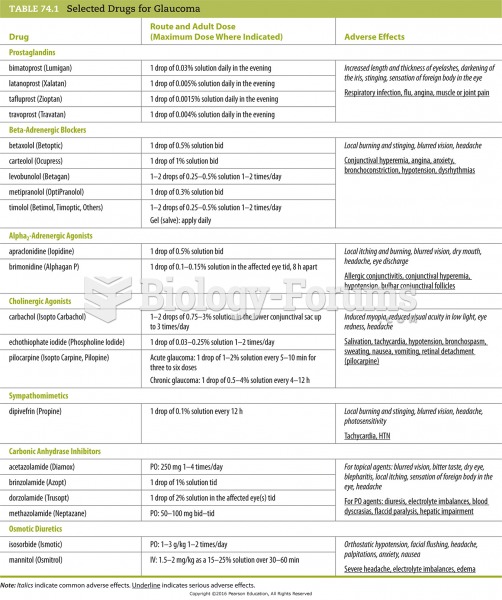Answer to Question 1
Correct Answer: 4
Rationale 1: Open-angle glaucoma develops slowly over years, with gradual degeneration of the optic nerve. There are limited early symptoms.
Rationale 2: Dry type is a term used to describe a particular type of macular degeneration.
Rationale 3: Wet type is a term used to describe a particular type of macular degeneration.
Rationale 4: Closed-angle glaucoma occurs when there is a sudden increase in intraocular pressure. The sudden obstruction of the flow of aqueous humor can result in dull-to-severe eye pain.
Global Rationale: Closed-angle glaucoma occurs when there is a sudden increase in intraocular pressure. The sudden obstruction of the flow of aqueous humor can result in dull-to-severe eye pain. Open-angle glaucoma develops slowly over years, with gradual degeneration of the optic nerve. There are limited early symptoms. Wet type and dry type refer to macular degeneration.
Answer to Question 2
Correct Answer: 1
Rationale 1: Diabetes is a risk factor for developing glaucoma. Early intervention reduces the risk of blindness due to glaucoma.
Rationale 2: Glaucoma does not occur as an adverse effect of insulin use.
Rationale 3: Stress can cause persistent pupil dilation that can be associated with closed-angle glaucoma, but it is not associated with increased production of aqueous humor.
Rationale 4: The client with diabetes has two reasons to have frequent eye examination: the early detection of glaucoma and retinal changes that can lead to blindness.
Global Rationale: Diabetes is a risk factor for developing glaucoma. Early intervention reduces the risk of blindness due to glaucoma. Glaucoma does not occur as an adverse effect of insulin use. Stress can cause persistent pupil dilation that can be associated with closed-angle glaucoma, but it is not associated with increased production of aqueous humor. The client with diabetes has two reasons to have frequent eye examination: the early detection of glaucoma and retinal changes that can lead to blindness.







